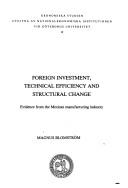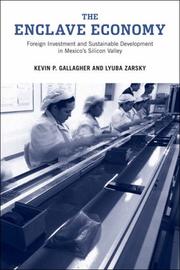| Listing 1 - 6 of 6 |
Sort by
|
Book
ISBN: 9781400855339 1400855330 Year: 2014 Publisher: Princeton Princeton University Press
Abstract | Keywords | Export | Availability | Bookmark
 Loading...
Loading...Choose an application
- Reference Manager
- EndNote
- RefWorks (Direct export to RefWorks)
In a historical treatment of Mexico beginning with the pre-Revolutionary period and focusing on the administration of Lazaro Cardenas (1934-1940), Nora Hamilton explores the possibilities and limits of reform in a capitalist society.Originally published in 1982.The Princeton Legacy Library uses the latest print-on-demand technology to again make available previously out-of-print books from the distinguished backlist of Princeton University Press. These editions preserve the original texts of these important books while presenting them in durable paperback and hardcover editions. The goal of the Princeton Legacy Library is to vastly increase access to the rich scholarly heritage found in the thousands of books published by Princeton University Press since its founding in 1905.
Investments, Foreign --- Elite (Social sciences) --- Mexico --- Economic policy. --- Social policy. --- Foreign economic relations. --- E-books --- Elite (Social sciences) -- Mexico. --- Investments, Foreign -- Mexico. --- Mexico -- Economic policy. --- Mexico -- Foreign economic relations. --- Mexico -- Social policy. --- Business & Economics --- Economic History
Book
ISBN: 2130359361 9782130359364 Year: 1979 Publisher: PUF
Abstract | Keywords | Export | Availability | Bookmark
 Loading...
Loading...Choose an application
- Reference Manager
- EndNote
- RefWorks (Direct export to RefWorks)
Third World: economic development problems --- Mexico --- Corporations, Foreign --- Investments, Foreign --- Case studies. --- Capital exports --- Capital imports --- FDI (Foreign direct investment) --- Foreign direct investment --- Foreign investment --- Foreign investments --- International investment --- Offshore investments --- Outward investments --- Capital movements --- Investments --- Foreign corporations --- Juristic persons, Foreign --- Aliens --- Business enterprises, Foreign --- Corporation law --- International business enterprises --- Corporations --- Case studies --- Nationality --- Developing countries: economic development problems --- Corporations, Foreign - Mexico - Case studies. --- Investments, Foreign - Mexico - Case studies.
Book
ISBN: 0566002248 9780566002243 Year: 1979 Publisher: Westmead Saxon House
Abstract | Keywords | Export | Availability | Bookmark
 Loading...
Loading...Choose an application
- Reference Manager
- EndNote
- RefWorks (Direct export to RefWorks)
Corporations, Foreign --- Investments, Foreign --- 658.114 <8> --- -Investments, Foreign --- -#SBIB:316.334.2A25 --- #SBIB:316.334.2A465 --- Capital exports --- Capital imports --- FDI (Foreign direct investment) --- Foreign direct investment --- Foreign investment --- Foreign investments --- International investment --- Offshore investments --- Outward investments --- Capital movements --- Investments --- Foreign corporations --- Juristic persons, Foreign --- Aliens --- Business enterprises, Foreign --- Corporation law --- International business enterprises --- Corporations --- Forms of enterprise in general. Private businesses--Zuid-Amerika --- Case studies --- Na-oorlogse industriële ontwikkeling: concentratie en multinationalisering --- Arbeidssociologie: patronale strategieën: multinationalisering van ondernemersstrategieën --- Nationality --- 658.114 <8> Forms of enterprise in general. Private businesses--Zuid-Amerika --- #SBIB:316.334.2A25 --- Corporations, Foreign - Mexico - Case studies --- Investments, Foreign - Mexico - Case studies

ISBN: 917222617X 9789172226173 Year: 1983 Volume: 12 Publisher: Göteborg Göteborgs universitet. Nationalekonomiska institutionen
Abstract | Keywords | Export | Availability | Bookmark
 Loading...
Loading...Choose an application
- Reference Manager
- EndNote
- RefWorks (Direct export to RefWorks)
Manufacturing industries --- Investments, Foreign --- International business enterprises --- Industrial productivity --- -International business enterprises --- -Industrial productivity --- -Manufacturing industries --- -Industries --- Manufactures --- Productivity, Industrial --- TFP (Total factor productivity) --- Total factor productivity --- Industrial efficiency --- Production (Economic theory) --- Business enterprises, International --- Corporations, International --- Global corporations --- International corporations --- MNEs (International business enterprises) --- Multinational corporations --- Multinational enterprises --- Transnational corporations --- Business enterprises --- Corporations --- Joint ventures --- Capital exports --- Capital imports --- FDI (Foreign direct investment) --- Foreign direct investment --- Foreign investment --- Foreign investments --- International investment --- Offshore investments --- Outward investments --- Capital movements --- Investments --- -Investments, Foreign --- Manufacturing industries - Mexico --- Investments, Foreign - Mexico --- International business enterprises - Mexico --- Industrial productivity - Mexico

ISBN: 0262072858 9780262072854 9780262572422 0262572427 9786612099007 026227339X 1282099000 1429492414 9780262273398 9781429492416 Year: 2007 Publisher: Cambridge, Mass. : MIT Press,
Abstract | Keywords | Export | Availability | Bookmark
 Loading...
Loading...Choose an application
- Reference Manager
- EndNote
- RefWorks (Direct export to RefWorks)
Analyzes the extent to which foreign investment in Mexico's information technology sector brought economic, social, and environmental benefits to Guadalajara.Foreign investment has been widely perceived as a panacea for developing countries--as a way to reduce poverty and kick-start sustainable modern industries. The Enclave Economy calls this prescription into question, showing that Mexico's post-NAFTA experience of foreign direct investment in its information technology sector, particularly in the Guadalajara region, did not result in the expected benefits. Charting the rise and fall of Mexico's "Silicon Valley," the authors explore issues that resonate through much of Latin America and the developing world: the social, economic, and environmental effects of market-driven globalization. In the 1990s, Mexico was a poster child for globalization, throwing open its borders to trade and foreign investment, embracing NAFTA, and ending the government's role in strengthening domestic industry. But The Enclave Economy shows that although Mexico was initially successful in attracting multinational corporations, foreign investments waned in the absence of active government support and as China became increasingly competitive. Moreover, the authors find that foreign investment created an "enclave economy" the benefits of which were confined to an international sector not connected to the wider Mexican economy. In fact, foreign investment put many local IT firms out of business and transferred only limited amounts of environmentally sound technology. The authors suggest policies and strategies that will enable Mexico and other developing countries to foster foreign investment for sustainable development in the future.
Guadalajara (Mexico) -- Economic conditions. --- High technology industries -- Mexico -- Guadalajara. --- Information technology -- Mexico -- Guadalajara. --- Investments, Foreign -- Mexico -- Guadalajara. --- Sustainable development -- Mexico -- Guadalajara. --- High technology industries --- Information technology --- Investments, Foreign --- Sustainable development --- Business & Economics --- Economic History --- Guadalajara (Mexico) --- Economic conditions. --- Development, Sustainable --- Ecologically sustainable development --- Economic development, Sustainable --- Economic sustainability --- ESD (Ecologically sustainable development) --- Smart growth --- Sustainable economic development --- Capital exports --- Capital imports --- FDI (Foreign direct investment) --- Foreign direct investment --- Foreign investment --- Foreign investments --- International investment --- Offshore investments --- Outward investments --- IT (Information technology) --- Environmental aspects --- Economic development --- Capital movements --- Investments --- Technology --- Telematics --- Information superhighway --- Knowledge management --- Industries --- ENVIRONMENT/Environmental Politics & Policy
Book
ISBN: 1484388925 1484388895 Year: 2015 Publisher: Washington, D.C. : International Monetary Fund,
Abstract | Keywords | Export | Availability | Bookmark
 Loading...
Loading...Choose an application
- Reference Manager
- EndNote
- RefWorks (Direct export to RefWorks)
This paper utilizes a new dataset of foreign and domestic mutual funds in Mexico to assess their behavior and obtains three new findings. First, foreign mutual funds are more sensitive to global financial conditions and engage more in herding and positive feedback trading than domestic mutual funds, notably during episodes of market stress. Second, the behavior of foreign funds differs substantially across types of funds: bond funds are more sensitive to global factors and engage more in positive feedback trading than equity funds; funds sold to retail investors, open-end funds, small funds, and regional funds also appear to be less stable sources of capital flows. Third, there is indicative evidence that foreign funds’ trading behavior is associated with higher local market volatilities, notably in periods of market stress; however, domestic mutual fund investors played some mitigating role.
Capital market -- Mexico. --- Capital movements -- Mexico. --- Investments, Foreign -- Mexico. --- Mutual funds -- Mexico. --- Finance --- Business & Economics --- Investment & Speculation --- Investments: Bonds --- Investments: Stocks --- Macroeconomics --- Industries: Financial Services --- Current Account Adjustment --- Short-term Capital Movements --- Pension Funds --- Non-bank Financial Institutions --- Financial Instruments --- Institutional Investors --- International Financial Markets --- Portfolio Choice --- Investment Decisions --- Information and Market Efficiency --- Event Studies --- General Financial Markets: General (includes Measurement and Data) --- General Aggregative Models: General --- Financial Crises --- Investment & securities --- Economic & financial crises & disasters --- Mutual funds --- Bonds --- Stocks --- Flow of funds --- Global financial crisis of 2008-2009 --- Financial institutions --- National accounts --- Sovereign bonds --- Global Financial Crisis, 2008-2009 --- Mexico
| Listing 1 - 6 of 6 |
Sort by
|

 Search
Search Feedback
Feedback About
About Help
Help News
News